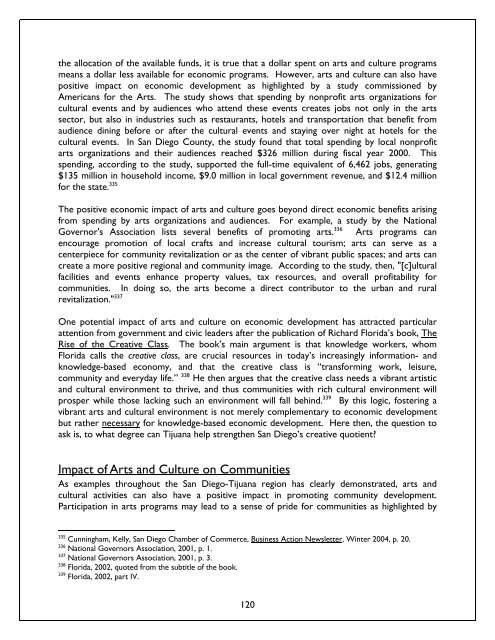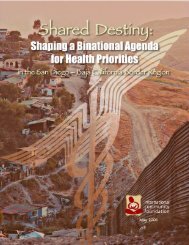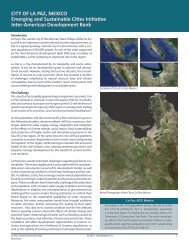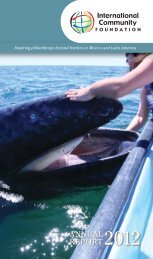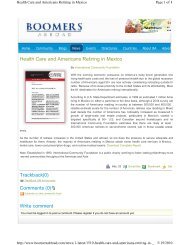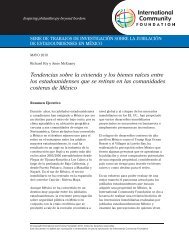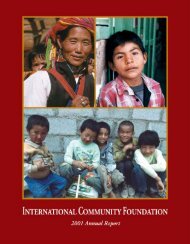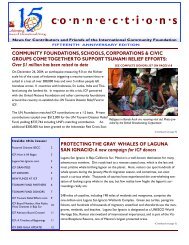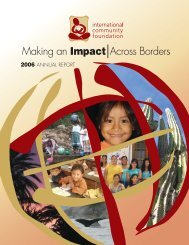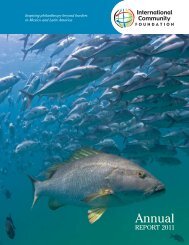Blurred Borders - International Community Foundation
Blurred Borders - International Community Foundation
Blurred Borders - International Community Foundation
You also want an ePaper? Increase the reach of your titles
YUMPU automatically turns print PDFs into web optimized ePapers that Google loves.
the allocation of the available funds, it is true that a dollar spent on arts and culture programs<br />
means a dollar less available for economic programs. However, arts and culture can also have<br />
positive impact on economic development as highlighted by a study commissioned by<br />
Americans for the Arts. The study shows that spending by nonprofit arts organizations for<br />
cultural events and by audiences who attend these events creates jobs not only in the arts<br />
sector, but also in industries such as restaurants, hotels and transportation that benefit from<br />
audience dining before or after the cultural events and staying over night at hotels for the<br />
cultural events. In San Diego County, the study found that total spending by local nonprofit<br />
arts organizations and their audiences reached $326 million during fiscal year 2000. This<br />
spending, according to the study, supported the full-time equivalent of 6,462 jobs, generating<br />
$135 million in household income, $9.0 million in local government revenue, and $12.4 million<br />
for the state. 335<br />
The positive economic impact of arts and culture goes beyond direct economic benefits arising<br />
from spending by arts organizations and audiences. For example, a study by the National<br />
Governor's Association lists several benefits of promoting arts. 336 Arts programs can<br />
encourage promotion of local crafts and increase cultural tourism; arts can serve as a<br />
centerpiece for community revitalization or as the center of vibrant public spaces; and arts can<br />
create a more positive regional and community image. According to the study, then, "[c]ultural<br />
facilities and events enhance property values, tax resources, and overall profitability for<br />
communities. In doing so, the arts become a direct contributor to the urban and rural<br />
revitalization." 337<br />
One potential impact of arts and culture on economic development has attracted particular<br />
attention from government and civic leaders after the publication of Richard Florida’s book, The<br />
Rise of the Creative Class. The book’s main argument is that knowledge workers, whom<br />
Florida calls the creative class, are crucial resources in today’s increasingly information- and<br />
knowledge-based economy, and that the creative class is “transforming work, leisure,<br />
community and everyday life.” 338 He then argues that the creative class needs a vibrant artistic<br />
and cultural environment to thrive, and thus communities with rich cultural environment will<br />
prosper while those lacking such an environment will fall behind. 339 By this logic, fostering a<br />
vibrant arts and cultural environment is not merely complementary to economic development<br />
but rather necessary for knowledge-based economic development. Here then, the question to<br />
ask is, to what degree can Tijuana help strengthen San Diego’s creative quotient?<br />
Impact of Arts and Culture on Communities<br />
As examples throughout the San Diego-Tijuana region has clearly demonstrated, arts and<br />
cultural activities can also have a positive impact in promoting community development.<br />
Participation in arts programs may lead to a sense of pride for communities as highlighted by<br />
335 Cunningham, Kelly, San Diego Chamber of Commerce, Business Action Newsletter, Winter 2004, p. 20.<br />
336 National Governors Association, 2001, p. 1.<br />
337 National Governors Association, 2001, p. 3.<br />
338 Florida, 2002, quoted from the subtitle of the book.<br />
339 Florida, 2002, part IV.<br />
120


